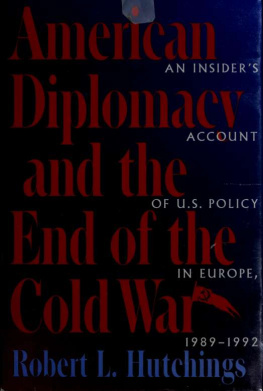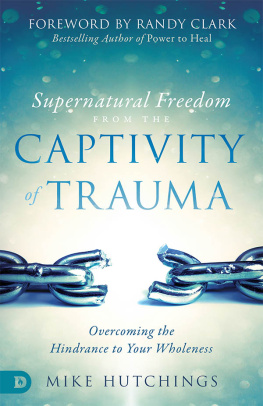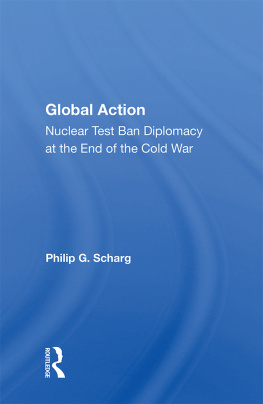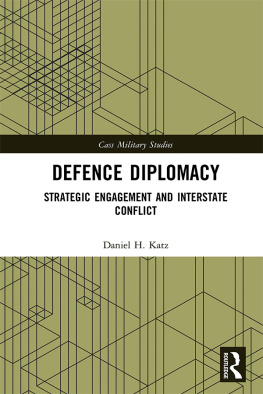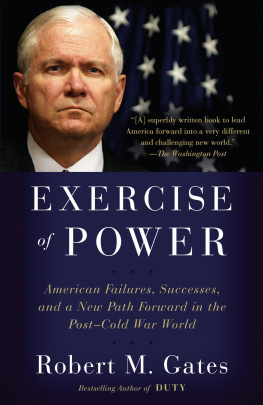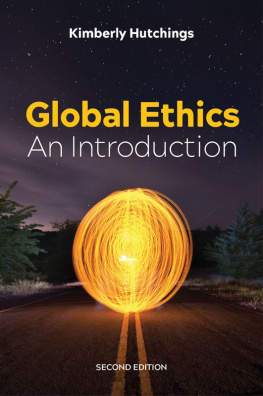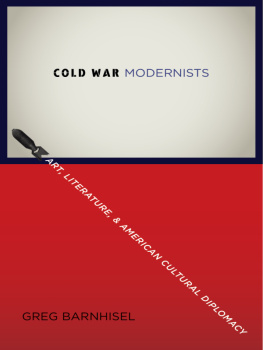Robert L. Hutchings - American diplomacy and the end of the Cold War
Here you can read online Robert L. Hutchings - American diplomacy and the end of the Cold War full text of the book (entire story) in english for free. Download pdf and epub, get meaning, cover and reviews about this ebook. year: 1997, publisher: Johns Hopkins University Press, genre: Politics. Description of the work, (preface) as well as reviews are available. Best literature library LitArk.com created for fans of good reading and offers a wide selection of genres:
Romance novel
Science fiction
Adventure
Detective
Science
History
Home and family
Prose
Art
Politics
Computer
Non-fiction
Religion
Business
Children
Humor
Choose a favorite category and find really read worthwhile books. Enjoy immersion in the world of imagination, feel the emotions of the characters or learn something new for yourself, make an fascinating discovery.
- Book:American diplomacy and the end of the Cold War
- Author:
- Publisher:Johns Hopkins University Press
- Genre:
- Year:1997
- Rating:4 / 5
- Favourites:Add to favourites
- Your mark:
- 80
- 1
- 2
- 3
- 4
- 5
American diplomacy and the end of the Cold War: summary, description and annotation
We offer to read an annotation, description, summary or preface (depends on what the author of the book "American diplomacy and the end of the Cold War" wrote himself). If you haven't found the necessary information about the book — write in the comments, we will try to find it.
American diplomacy and the end of the Cold War — read online for free the complete book (whole text) full work
Below is the text of the book, divided by pages. System saving the place of the last page read, allows you to conveniently read the book "American diplomacy and the end of the Cold War" online for free, without having to search again every time where you left off. Put a bookmark, and you can go to the page where you finished reading at any time.
Font size:
Interval:
Bookmark:

This book made available by the Internet Archive.





For Kim
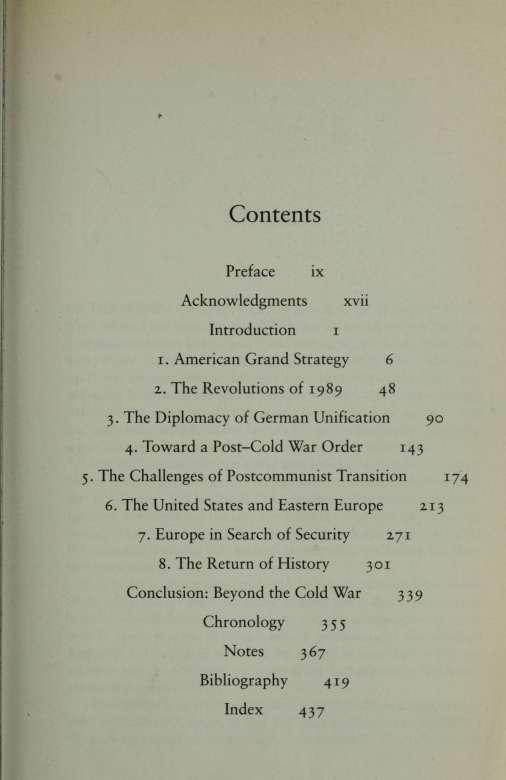
Preface
IN THE SPRING OF 1988, I gave a speech at the University of Virginia, where I had done my doctoral work a decade earlier. I argued five propositions: Soviet foreign policy had undergone an historic shift, Germany's role in Europe was changing fundamentally, the "European idea" was stronger than at any time since 1919, the United States was retreating from an active role in European affairs, and Eastern Europe would be the arena in which Europe's future would be decided, as it had been twice already in the century. 1 It was a forecast of impending major change in Europe and an appeal to American leadership.
Little did I suspect that just a year later I would be called on to play a role in these events as director for European affairs with the National Security Council. Still less could I have imagined how broadly these perspectives were shared at the senior levels of the incoming Bush administration, which set about acting on them with a decisiveness that belied my lament on declining U.S. leadership even while vindicating the other four propositions.
This is not to imply causality. I had no role in influencing the views of President George Bush, Secretary of State James Baker, or National Security Adviser Brent Scowcroft before Bush's inauguration as president in January 1989. As a nonpartisan professional, I was involved neither in the campaign nor with the transition team but rather was asked to join the NSC staff by virtue of my background in East European and German affairs.
I came to this field late, in my second year of graduate school, and almost by accident. A course in East European politics, taken mainly out of curiosity, piqued an interest that soon deepened. This field seemed
where everything that mattered in international politics came together. It was where East met West, where liberal democracy confronted the communist experiment, where Karl Marx met John Stuart Mill. Moral questions were sharply defined; the human dramas were compelling. After graduate school I became deputy director of Radio Free Europe in Munich, diverted from an academic career by one of those opportunities too good to miss. For five years in the early 1980s I lived in divided Germany, among RFE's brilliant emigre communities, spending every working hour and many private ones totally absorbed in Central and Eastern European affairs. By the end of the 1980s, when Poland and Hungary stood on the threshold of revolutionary change, it was as if my whole career had been preparation for playing a role in Eastern Europe's liberation and Germany's unification.
So perhaps it was fate or destiny that brought me to the Bush White House in 1989. Or maybe it was just luck. It certainly was not political connections, because I had none. Indeed, it was emblematic of Bush's bipartisanship in foreign policy that in three and a half years at the White House, no one ever asked which political party I belonged to or for whom I voted in the 1988 election. I had reason to believe I would fit in with the Bush administration's general foreign policy orientation but was surprisedor rather, thrilledto find how closely the thinking of Bush, Baker, Scowcroft, and others who mattered coincided with my own. More than once in doing the research for this book, I came across a Baker speech of which I had been unaware yet felt that I might have drafted it myself, so closely did it reflect my own views.
This book is part political memoir, part eyewitness account, and part scholarly analysis. I have gone over events and decisions twice, as it werefirst as a participant or witness, second as a relatively detached scholar striving to understand and assess this period independent of my personal role in it. I have tried to combine the insider's unique perspective with the scholar's balanced judgment.
I was one of the dozen or so senior U.S. officials operating on the inside of policy making toward Europe and the Soviet Union at the end of the Cold War. Of course there were hundreds of officials involved in these policies and dozens more senior and influential than I. But only a handful of senior advisers around President Bush and Secretary Baker had a strategic vantage point and a direct role in formulating and implementing our broad strategies and policies toward Europe and the Soviet Union. On some issuesthe diplomacy of German unification, for
examplethe "dozen or so" grew to perhaps twice that number as negotiations proceeded. On others, notably strategy toward Central and Eastern Europe after the revolutionary crowds had gone home and the first flush of enthusiasm had faded, the number dropped to fewer than a half dozen.
This book concentrates on aspects where I had personal, direct, and intense involvement: Central and Eastern Europe before, during, and after the revolutions of 1989, Germany during the period of unification and thereafter, and broad strategies toward Europe and the Soviet Union throughout the period. It also covers, but in less detail, aspects where my involvement was more peripheral: U.S.-Soviet relations, arms control, security policy, and trade relations.
This book thus encompasses the whole story of the end of the Cold War in Europe, but from a particular vantage point, one that was as good as any other and better than most for assessing the diplomacy of the period. It was arguably the best vantage point, if one believes, as I do, that the countries of Eastern Europe were the key to ending the Cold War and the key to the post-Cold War order in Europe. This is where the issues that had divided East and West for forty years came together; this was the arena of most intense activity during the period; this was where Soviet, West European, and American policies met and interacted.
This book's span of time coincides with my tenure with the National Security Council from early 1989 to mid-1992. It begins with the development of American strategy at the beginning of 1989, continues through the revolutionary developments of 1989-90 and the security issues arising therefrom, and concludes with the collapse of the Soviet Union at the end of 1991. Key events immediately thereafter, such as the deepening Yugoslav war, are dealt with selectively.
Roles and Perspectives
We NSC staffers liked to think of ourselves as advisers to presidents and secretaries of state, and so we were. We were expected to be the principal initiators of policy ideas, which were then approved, rejected, or amended at the political level. This was our main responsibility and the reason we took the job in the first place.
Yet the more prosaic tasks like note taking went with the territory, too. When the president met with foreign counterparts here or abroad, my role most often was to take notes. This was my admission ticket to
Font size:
Interval:
Bookmark:
Similar books «American diplomacy and the end of the Cold War»
Look at similar books to American diplomacy and the end of the Cold War. We have selected literature similar in name and meaning in the hope of providing readers with more options to find new, interesting, not yet read works.
Discussion, reviews of the book American diplomacy and the end of the Cold War and just readers' own opinions. Leave your comments, write what you think about the work, its meaning or the main characters. Specify what exactly you liked and what you didn't like, and why you think so.

